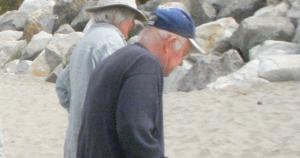This is taken from my thoughts at a conference on Phillip E. Johnson’s work following his memorial service.
 Phillip E. Johnson never stopped thinking about what is true and so he never stopped thinking about and supporting what is called the “intelligent design movement.” He began to suspect that he would not personally see the broader culture move in the direction he favored, but he had hope because he thought truth would prevail.
Phillip E. Johnson never stopped thinking about what is true and so he never stopped thinking about and supporting what is called the “intelligent design movement.” He began to suspect that he would not personally see the broader culture move in the direction he favored, but he had hope because he thought truth would prevail.
As a philosopher who first met him at the end of a dissertation on Plato, the soul, and science, Phillip was a refreshing intellect. He did not prescribe to any particular theory, any singular solutions, though he supported sensible ideas that needed his support. He was not content to ask what he could believe or what might be jury rigged together to save other ideas. Phil always wanted to know what was true.
As I see it, Phil framed questions about whether any naturalistic mechanism or fully materialist theory could account for everything. Could one get ideas, numbers, consciousness, mind from matter by starting only with matter and energy in mindless motion?
Phillip E. Johnson looked at the proposed solutions, especially the overarching stories of so called “science,” and was not satisfied. As a product of the best schools, Phil had been told there was a solution or at least several likely possibilities. He saw what a lawyer is trained to see: a weak case too often built on intellectual bluster, bluff, and bullying.
As a theist and a Christian, Phil was not interested in squeezing theism or Christianity into that system. He doubted it was true! The proponents of the naturalistic solutions kept saying, particularly when it related to biology and psychology, that we knew generally how things worked, or probably worked, we were just filling in the gaps.
“But is it true?” Phil would ask his critics and most often this question was ignored. He was happy to apply the same question to ideas he hoped would work out like the different notions floated by the growing number of scientists, philosophers, and thinkers associated (even loosely) with the intelligent design movement.
This is why he thought the “design” movement could and must remain a “big tent.” If one is not persuaded by the answers given by the majority, then one need not settle on one alternative set of answers. Instead, Phil sought the liberty for ideas to be pursued: that was at the heart of his intellectual program.
In his last call, Phillip E. Johnson was pressing educational reforms and alternatives. He knew, as he had always known, that though the truth is out there, along with goodness and beauty, truth had to be found and incarnated in new generations of scholars, activists, and educators.
Why education? As a theist, Phil was also a realist in the sense he wanted ideas applied to the world as the world is. As a man of ideas interested in how those ideas interact with matter and energy, he supported an open philosophy of science to find some better answers.
Phil knew that the quest for truth needed more minds. Nothing made him happier than seeing new people come to the Discovery Institute, or a Torrey Honors chum go on to finish graduate level work and pursue ideas. To the end, he was pressing for those of us pursuing the Constantine strategy, theistic realism applied to all of education in a kindergarten through college program, to multiply as quickly as possible. He was not bothered that all of those students did not come to the same conclusions, even his (tentative) conclusions. Instead, he was gratified to have helped set them free from the tyranny of a closed philosophy of science.
Truth should be pursued. As a result, he would often say with a puckish smile, “If we win, we shall,” meaning his friends, “have to switch sides as our side grows too powerful and so stale.” He did not live to see design or any of his educational offspring with that problem of success, but he was hopeful to the last day.
On the Thursday before he died, he was brimming with ideas confident as only a Socrates can be at the edge of the unknown that truth will prevail. He was fond of his intellectual children, proud where he thought they had surpassed him, with the confidence of a theist that God will protect the right. He even asked where I thought things were and was gratified to hear of a growing generation pursuing theist realism: his great passion. We must bear his going hence knowing the time was ripe: we honor him best by courageously examining his ideas, applying those that work, discarding those that become dated.
His was a mind awake that now has come to full awareness.
Thank God for Phillip E. Johnson.












